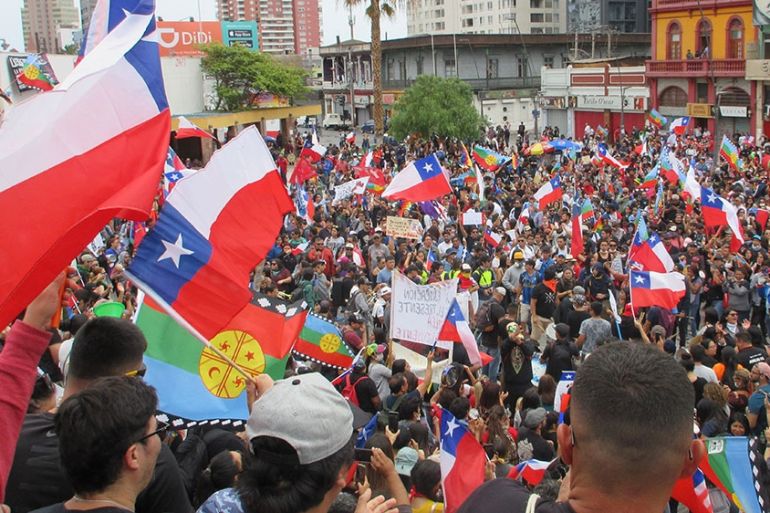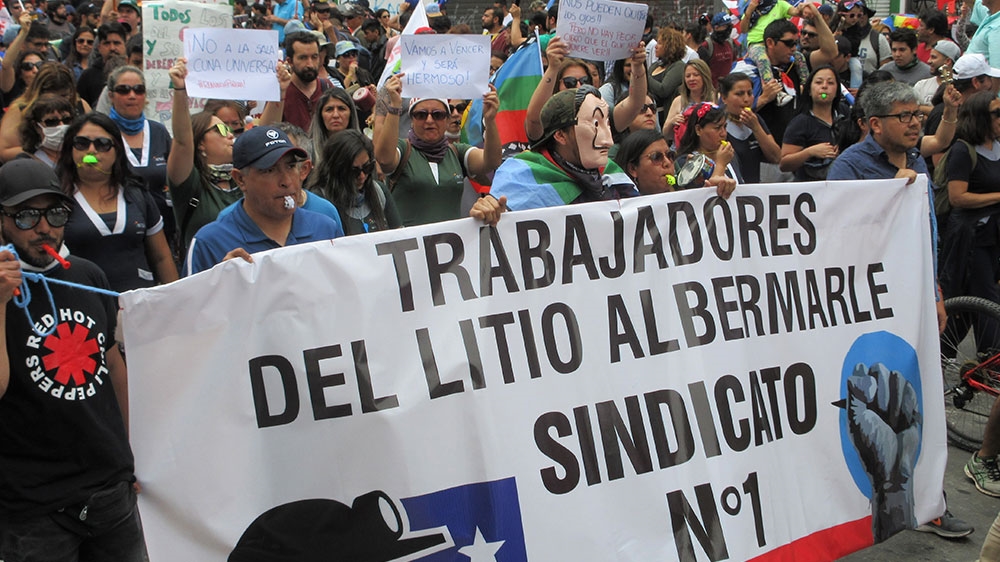Chile workers unions strike in support of ongoing protests
Unions present demands related to wages, pensions and union organising but their primary demand is a new constitution.

Antofagasta, Chile – Workers across key sectors in Chile went on strike on Tuesday in support of ongoing protests against the country’s political and economic model.
An alliance of dockworker, mining sector, construction, education, government employees and other union federations gave Chilean President Sebastian Pinera an ultimatum last week: either respond to demands in five days or deal with a nationwide work stoppage. Pinera did not respond.
Keep reading
list of 3 itemsChile protests: Chileans demand new constitution amid unrest
Chile: Protesters reject government plan to rewrite constitution
The unions presented demands related to wages, pensions, and union organising. But their primary demand is the same collective call uniting protests across Chile: a new constitution, drafted by a constitutional assembly with broad involvement.
“We have never had a constitution with citizen participation before,” said Pamela Pasache, a local leader of a Ministry of Education workers’ union in Antofagasta, in northern Chile.
The government on Sunday announced its support for a new constitution, but the process would take place in congress, which is not what protesters have been demanding. On Tuesday, 14 opposition political parties from across the ideological spectrum rejected the government proposal and expressed support for a constitutional assembly.
“This is the moment for change. The citizenry is tired of the political class, of not being heard or valued,” Pasache said.

After Tuesday’s strike action was initially called by a handful of union federations, energy, petroleum and copper sector unions announced they would participate. Santiago airport workers, Valparaiso metro workers, agro-industry unions, and others also joined.
Protests, barricades and road blockades began before dawn Tuesday in many parts of the country. Mass demonstrations, marches, and blockades were ongoing up and down the 4,270km (2,653 miles) length of Chile by the afternoon.
“This is not about a union movement, or any one social movement,” Eduardo Rojas, an Antofagasta dockworker union leader, told Al Jazeera.
“The people of Chile as a whole have taken to the streets to protest. That is why it is massive,” he said at a plaza where thousands of people were protesting, with thousands more on the way.
Peso slides
The alliance of unions that initially called for Tuesday’s strike have proposed 500,000 Chilean pesos ($635) for both the monthly minimum wage, which is currently 301,000 pesos ($386), and the minimum monthly pension payment. The proposals have widespread support among protesters.
Last week, Pinera announced a bill to guarantee a monthly minimum wage of 350,000 pesos ($444), but unions quickly pointed out the measure, aside from falling far short of demands, is, in fact, a government subsidy, not a true wage increase. The government would pay the difference to workers earning between 301,000 and 350,000 pesos.
Following the unrest, the government reduced its economic growth projections for this year. Its initial forecast of between 2.4 and 2.9 percent growth has dropped to between 1.8 and 2.2 percent, Chilean Minister of Finance Ignacio Briones announced on Twitter last week.
The Chilean peso on Tuesday dropped to an historic low of 800 pesos to the dollar before recovering slightly.
Briones reportedly warned of “grave consequences” for the economy and urged Chileans to help the country return to a sense of “normality”.
Workers participating in the strike actions on Tuesday hail from some of the most powerful sectors of the Chilean economy: mining, manufactured goods, and agriculture. The country’s economy relies heavily on natural resource and other exports, and therefore relies on port operations, noted Rojas, the union leader.
“This is our third work stoppage since protests began,” he said.
“Ports are paralysed from Arica to Punta Arenas,” he said. “Other ports that are not part of the Chilean Dockworkers Union have also joined in.”
Boycott on the table
The International Dockworkers Council warned an international solidarity boycott is on the table. Representing more than 125,000 dockworkers on five continents, the council expressed concern in a statement last week about police violence against Chilean protesters and dockworkers, in particular.
“Should the repression against the dockworker family intensify, we will initiate an international boycott of cargo from ships coming from the Republic of Chile,” the council said.
At least 23 people were killed during the first three weeks of the crisis, including five by military and police forces. Thousands of protesters have been detained and wounded, including more than 180 with severe eye injuries from rubber and metal projectiles shot by police.
Many groups on Tuesday demanded an immediate halt to repression along with a systemic transformation.

Chile needs radical change, and people are demanding popular participation in a constitutional assembly to create a new constitutional framework to enact that change, said Alejandro Garcia, a leader of the Antofagasta local of AnfuCultura, a Ministry of Culture workers union.
“Clearly, people do not agree with the measures the government has announced,” he told Al Jazeera.
“This is a call for permanent pressure,” he said. “We must not relinquish the streets.”
By Tuesday afternoon, a union-led march to Antofagasta’s Sotomayor plaza, renamed Plaza of the Revolution by protesters, was peppered with union, Chilean, LGBT pride, and indigenous Mapuche and Aymara flags. Hours-long marches were on their way from northern and southern areas of the Antofagasta region, and Rojas expected the crowd in the plaza to double in size by nightfall.
“This is going to multiply,” he said. “We want to demonstrate that unity is strength.”